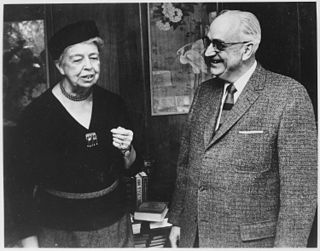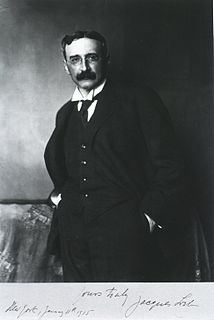A Quote by Jacob Bronowski
But nature - that is, biological evolution - has not fitted man to any specific environment. On the contrary, ... he has a rather crude survival kit; and yet -this is the paradox of the human condition - one that fits him to all environments. Among the multitude of animals which scamper, fly, burrow and swim around us, man is the only one who is not locked into his environment. His imagination, his reason, his emotional subtlety and toughness, make it possible for him not to accept the environment but to change it.
Quote Topics
Accept
Among
Animals
Any
Around
Biological
Biological Evolution
Change
Condition
Contrary
Crude
Emotional
Environment
Environments
Evolution
Fits
Fitted
Fly
Him
His
Human
Human Condition
Imagination
Kit
Locked
Make
Man
Multitude
Nature
On The Contrary
Only
Paradox
Possible
Rather
Reason
Specific
Subtlety
Survival
Swim
Toughness
Us
Which
Related Quotes
The average man is what his environment and his superstitions have made him; and their function is to make him an ass. He can't add up three or four new circumstances together and perceive what they mean; it is beyond him. He is not capable of observing for himself; he has to get everything at second-hand. If what are miscalled the lower animals were as silly as man is, they would all perish from the earth in a year.
Rational behavior ... depends upon a ceaseless flow of data from the environment. It depends upon the power of the individual to predict, with at least a fair success, the outcome of his own actions. To do this, he must be able to predict how the environment will respond to his acts. Sanity, itself, thus hinges on man's ability to predict his immediate, personal future on the basis of information fed him by the environment.
Man is more than his environment. It is from the innate quality of the Spirit in him, his inner storehouse, that he draws those ideas, his intuitions, which unify his perceptions of the external world instantaneously with a value which is qualitative and not quantitative, and which he embodies in the works of his culture - those achievements which belong not only to one particular time but to all times, and mark the path of his upward progress.
History is the long struggle of man, by exercise of his reason, to understand his environment and to act upon it. But the modern period has broadened the struggle in a revolutionary way. Man now seeks to understand, and act on, not only his environment, but himself; and this has added, so to speak, a new dimension to reason and a new dimension to history.
When a trout rising to a fly gets hoooked on a line and finds himself unable to swim about freeely, he begins with a fight which results in struggles and splashes and sometimes an escape. Often, of course, the situation is too tough for him. In the same way the human being struggles with his environment and with the hooks that catch him. Sometimes he masters his difficulties; sometimes they are too much for him. His struggles are all that the world sees and it naturally misunderstands them. It is hard for a free fish to understand what is happening to a hooked one.
Man is a megalomaniac among animals-if he sees mountains he will try to imitate them by pyramids, and if he sees some grand process like evolution, and thinks it would be at all possible for him to be in on that game, he would irreverently have to have his whack at that too. That daring megalomania of his-has it not brought him to his present place?
The consideration of man's body has not changed to meet the new conditions of this artificial environment that has replaced his natural one. The result is that of perceptual discord between man and his environment. The effect of this discord is a general deterioration of man's body, the symptoms of which are termed disease.
I have never gone into a picture without first studying my characterization from all angles. I make a study of the fellow's life and try to learn everything about him, including the conditions under which he came into this world, his parentage, his environment, his social status, and the things in which he is interested. Then I attempt to get his mental attitude as much as possible.
Man is a spiritual being, a soul, and at some period of his life everyone is possessed with an irresistible desire to know his relationship to the Infinite. . . . There is something within him which urges him to rise above himself, to control his environment, to master the body and all things physical and live in a higher and more beautiful world.
Strange is the vigour in a brave man's soul. The strength of his spirit and his irresistible power, the greatness of his heart and the height of his condition, his mighty confidence and contempt of danger, his true security and repose in himself, his liberty to dare and do what he pleaseth, his alacrity in the midst of fears, his invincible temper, are advantages which make him master of fortune.




































